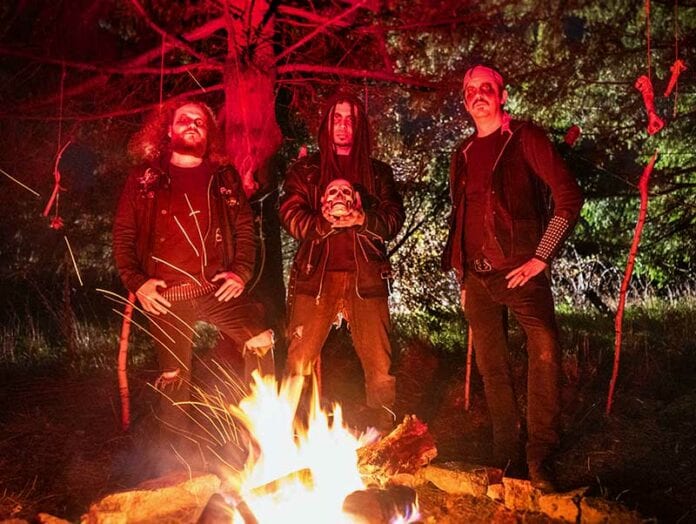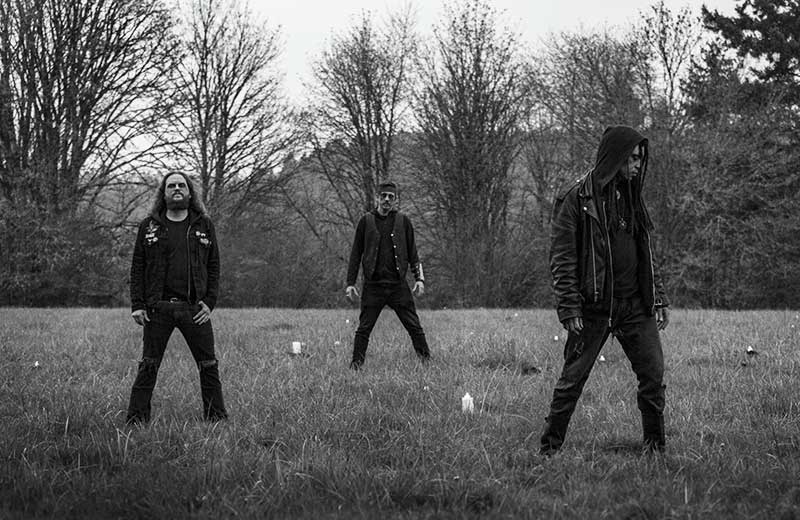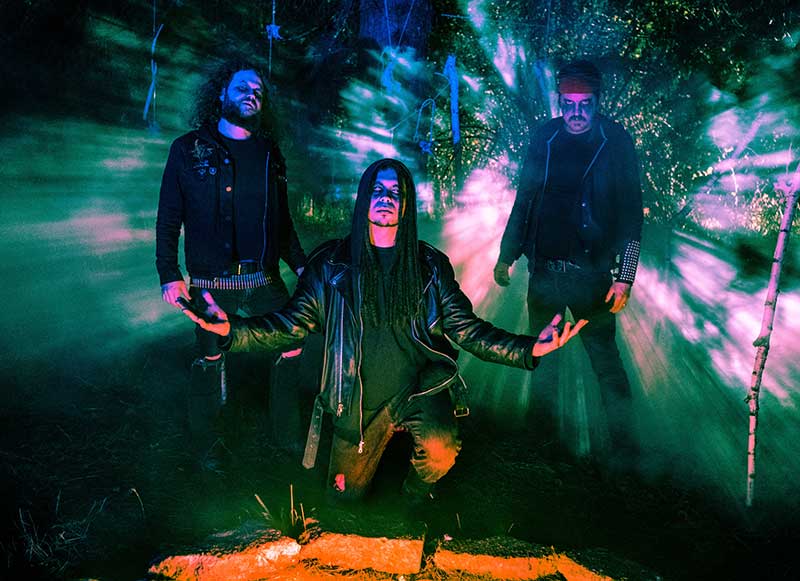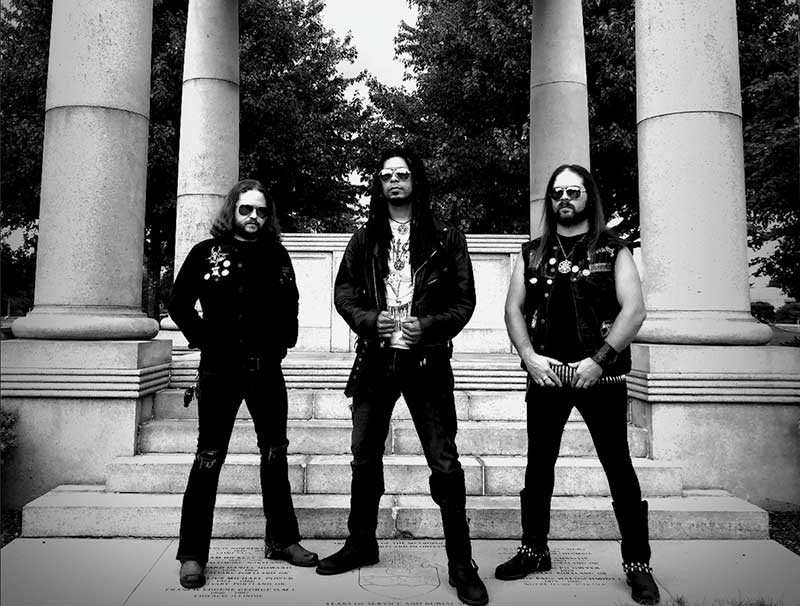
INTERVIEW WITH ANDY “INFERNAL MAGUS OF NOCTURNAL ALCHEMY” MERCIL BY KEVIN STEWART-PANKO
The core members of Portland’s Bewitcher are headbanging, earth dog rivet heads to the death. Okay, maybe not to the death, but they have sacrificed the creature comforts and stability of workaday life for the chance to rock out and travel around spreading their metallic fire and brimstone, living by the skin o’ their teeth in the process.
Starting life as a bedroom homage to the glory days of 80s speed, thrash, and black metal, bassist Andy “Infernal Magus of Nocturnal Alchemy” Mercil and guitarist/vocalist Mateo “Unholy Weaver of Shadows and Incantations” Litton have grown Bewitcher into a bright light in the underground metal scene with their second album Under the Witching Cross (via Shadow Kingdom Records), shattering expectations in the creation of an exciting mix of land speed record tempos, melodic pot stirring, and heaping helpings of evil that skirts between PMRC knicker twisting despair and cartoonish incredulity. We roused Mr. Nocturnal Alchemy from his mid morning daydreams about the 1983 and 1984 metal scene to chat about life in a band without a drummer, living larger than life, and living a parsimonious life so that you can really live the life you want to live.
I always hate asking this question, but since this is your first appearance in Outburn, let’s pretend no one knows anything about Bewitcher. So, let me ask if you can give a brief band history?
Mateo and I formed the band in 2013. The other band we were in folded, and we were kicking around this idea of getting back to the roots of heavy metal and black metal. There was a lot of Motörhead kicking around, so we were just like, “Fuck, let’s just do that instead of reinventing the wheel.” We put out three demo EPs that we recorded ourselves in my apartment. Those were pretty well received, as we were able to get them released on cassette worldwide through some really small independent labels that did like a 50 copy run of them. That led us to Diabolic Might Records, who approached us about putting out a full-length on vinyl, which is every metalhead’s dream. We finally got a drummer, did that, and that [self-titled debut] came out in 2016. So, it took us a couple years to get to that point. Shortly after that, we pretty much hit the road. We came to the conclusion that we hate our jobs and just want to do this, and that’s where we’re at now, just plugging away and trying to keep the speed metal thing going.
On the early releases, you’re both credited as playing drums. Who did what on those releases?
On the early demos, we used digital drums. So, me and him programmed all the drums together. Mateo is pretty much the primary songwriter. He brings the riffs and the guitar stuff. I bring a couple here and there, but it’s pretty much 99 percent him. So, it was him playing guitar, me playing bass, and both of us programming drums.
How would you say your previous bands compare to what you’re doing with Bewitcher?
I would say Mateo’s black metal side-project was probably the closest thing. Dominus Morti was more him really delving into obscure, underground black metal, whereas our other band [Stonecreep], which we don’t give a fuck about anymore, was us being young and trying to figure it out while playing in a band with our best friends. Everyone was throwing in their ideas and there was no direction. We would like this band and that band, and we were trying to make it all work together and it was a clusterfuck. Like every young metalhead, we wanted to do it all and come up with something original. We did that band for 10 years and nothing ever happened. When that band ended up folding, we asked ourselves why we were trying to do that when these other guys already did it right. So, let’s just do what they’re doing (laughs).

And, as I understand it, you’ve had somewhat of a history with drummers coming and going.
During the demo phase, we didn’t even perform live for the first two years. We were just putting out cassettes and trying to spread the word. We wanted to do it from a DIY tape trading perspective instead of doing what everyone else was doing. There was some interest, so we just recorded them ourselves and put them out. We didn’t even have a drummer until the fall of 2015. We had a full-time drummer the entire time from then until recently when we got to the point where we had to part ways. We have a new drummer now [Aris Wales], but we’re kind of going back to where it’s just me and Mateo as the band leaders and founders. We are Bewitcher, and, for the time being, we like the idea of having a revolving door of drummers. The guy we have jamming with us now is definitely the guy, but for all intents and purposes, Bewitcher is me and Mateo.
Does that revolving door mentality make it difficult for a drummer to dedicate themselves to Bewitcher because they know you have that policy and that you kind of don’t give a shit about them?
(laughs) It definitely puts us in a weird position, but it’s actually a little more liberating. When we let our other drummer go, we made a conscious effort to—instead of jumping on the first guy, bringing him in the band, and giving equal shares of everything—keep a stable of drummers, so if we have a tour opportunity that comes up and one guy can’t do it, maybe another guy can instead. We’ve found that having that honest approach with everyone has been pretty cool, because in Portland every drummer is in five bands or is married and has kids. Finding full-time members to commit is really difficult. For us, it was more like, “We respect where you’re at. You have other projects. You have a life. You’ve got a house to pay for. If you can go on tour for a month, that’s awesome. If you can’t, we’ll find someone else, and that’s cool.” It’s definitely not a “We don’t give a fuck about you” thing (laughs). It’s more that this ship is going full steam, and if you’re onboard, that’s awesome. But if you can’t commit, that’s cool too, and we’ll make it work.
“WE STILL WANT TO KEEP THAT ELEMENT OF HEAVY METAL BEING A SHOW THAT’S BIGGER THAN A BUNCH OF DUDES WHO JUST GOT OFF OF WORK AND ARE PLAYING IN THEIR WORK SHIRTS.”
What can you tell us about the history behind your pseudonyms?
In the beginning, we wanted to keep it mysterious and add a little bit of that occult element to it. We took inspiration from the masters and even some more recent stuff, like what The Devil’s Blood did where you didn’t even know who the members were on the first couple of releases, it was just their initials. We love that kind of mystery certain bands brought to their art as opposed to “Here’s Joe Schmoe off the street who’s in this band.” You go back to Kiss, and nobody knew who they were back in the 70s. They were larger than life and were monsters. Starting from that perspective was really intriguing for us. We got to where we are now, and with the internet, once we went up on metal-archives.com, people knew who we were and had already linked all our old projects together. I don’t even know how they knew who we were! (laughs) I guess the mystery is gone, but we still want to roll with that. We still want to keep that element of heavy metal being a show that’s bigger than a bunch of dudes who just got off of work and are playing in their work shirts. We grew up on the big shows and love that perspective. Maybe Rob Zombie’s not a great example of metal, but when we were kids, he put on a great show. It was a spectacle and bigger than dudes just showing up and playing. We want it to be that you’re here to headbang and worship at the throne of Satan. Let’s play some rock ‘n’ roll (laughs).
I wasn’t so much referring to your use of pseudonyms, as I was to the over-the-top nature of your pseudonyms.
Oh (laughs). I believe Mateo came up with his first and just put it up on our Facebook page. I was like, “That’s fucking awesome. I’m doing the same thing!” Again, instead of a simple name, we were like, “Let’s make it huge and evil sounding and have fun with it.” That was the intention.
Given your intent to create a spectacle and show, how do you create that sensation in small clubs and with a limited budget?
We try to keep it as simple as possible, because when you’re playing smaller clubs on shows with five bands crammed on the bill, you don’t have the ability to do a big production. We just like to set the stage with lights. Lighting is very important to us and fog whenever we can. When I go see a band and it’s a dry stage, it seems so sterile to me. Something as simple as fogging the stage up and getting the right lighting suddenly transports you to another place. Fire plays a huge role in everything from our lyrical content to imagery, so whenever we can, we try to bring candles to create that ritual vibe. Speed metal is a thing where, in the past, it was just amps, leather and denim, studs and spikes, and headbanging. We wanted to create more of a space where people are transported.

All of the songs from the first album appeared on those first three demos. Were those songs re-recorded for the record?
All the songs were from the demos, and we actually went into the studio with Joel Grind of Toxic Holocaust. We cherry picked what we felt were the best songs that complemented and fit with what we were trying to do and that also flowed as an album because the listening experience and albums are still important to us. At that point we had a drummer, so instead of taking the demos and putting them out, which was the record label’s intention at first, we re-recorded them and gave it a proper release.
How far back does the material on Under the Witching Cross go?
We were pretty fortunate. “Rome Is on Fire” was on one of those on the original demos and has been around since 2014. “In the Sign of the Goat” was actually going to be on a split with another band. That was supposed to be in 2015, but it just didn’t happen. So, we’ve had those songs around for a while. We’re never not writing. We’ve already begun the process of writing the third album. We’re fortunate in the sense that coming from the musical direction we come from, we keep it simple. We’re always drawing from the influences we have, and we’re always creating and writing. I think Mateo already has five or six songs for the next release, plus we might even put out a 10-inch with four songs that don’t really fit on the full-length. But to answer your question, it wasn’t difficult to do the second album. We already had half of it written before we even put out the first album. It was just a matter of where we wanted to take the songs and what the inspiration was. It came together pretty quickly.
During the writing process, do you ever find yourselves with riffs and that sound too much like Venom, Motörhead, Destroyer 666, etc. and throwing them away despite the fact Bewitcher is beholden to a certain sound and set of influences?
Mateo would be the person to really answer that one, but having worked with him as long as I have and knowing his writing style, I know it’s very important for him to put our own identity on a lot of this stuff. I know for a fact that if he writes a song that sounds like Venom’s “Black Metal” for example, he’s going to do everything he can to evolve the song to the point it’s not so obvious. Through the natural course of songwriting, that happens unless we’re trying to do a deliberate homage to one of those bands. For example, “Hexenkrieg,” the last single we released, was definitely an obvious nod to Venom. That was also our way of saying we were going to stop leaning so heavily on them and move on into our direction. That song was our obvious send-off.
There are a million and one bands doing old school thrash/speed/black metal. As someone who’s in the band but isn’t the principle songwriter, what differences do you hear in Bewitcher, and what do you hear as your band’s spin on things?
We start with the foundation of the D-beat, that Motörhead-esque driving rhythm, and I hear early Metallica in there for sure. I’m the traditional doom guy in the band, so I like to try and sprinkle in elements of Candlemass and that kind of thing. These are things that may not be obvious to some listeners, but for me there are dirge-y parts in songs where I want it to slow down and have that heavy doom overtone, but it doesn’t sound like something off of Epicus Doomicus Metalicus. Another influence on the new album that I don’t think a lot of people are going to pick up on is 80s glam. We grew up on that stuff and in recent years have gone back to it. So, there’s stuff like Dokken. In one song “Heathen Woman,” we changed gears and went into a sleazy LA glam rock out section.
With that in mind, what are some of the more outlandish or off-base comparisons you’ve heard about Bewitcher?
(laughs) We get reviews back all the time, which is exciting, but sometimes it’s like, “What album were you listening to?” One of the ones I hear come up a lot is Pantera. Dude, I grew up in the 90s and with 90s metal and I had my Pantera phase, but I hear zero Pantera in our sound. So, when I hear that, I’m like, “Wow, okay. This person’s influences obviously don’t go past the top tier metal bands.” I’ve heard Machine Head, and that’s another where I don’t know where people are coming from. I’ve heard Slipknot come up, and it’s funny because some of these reviews are coming from foreign places, so I don’t even know what they’re saying. You just skim it for words you recognize and sometimes these band names jump out and it’s like, “Okay, interesting.”
“NOW IT’S SOMETHING BIGGER THAN JUST SOME BAND, AND UNDER THE WITCHING CROSS IS OUR MISSION STATEMENT, OUR MODUS OPERANDI FOR WHAT WE’RE DOING.”
What’s the story behind the album’s title, Under the Witching Cross?
I’ve been getting asked this quite a lot, and it’s a lot of fun. So, again, when we formed the band, we wanted it to be bigger than just another metal band. We decided to create everything around this faceless witch, which has become our unofficial mascot, as an easily recognizable symbol. Witchcraft and Satanism were playing huge roles in the lyrical content, and I’m more of the visual guy. I take care of t-shirts and merch and stuff, so I had this idea I was toying around with involving the moon and inverted crosses. I wanted to try and combine those two elements, and I created the witching cross, which has become our emblem or sigil. Now it’s something bigger than just some band, and Under the Witching Cross is our mission statement, our modus operandi for what we’re doing.
How involved were you in the cover art?
For the painting, we worked with Mariusz Lewandowski, who’s probably most famous for the Bell Witch album that came out a couple years ago [Mirror Reaper]. Mateo had this idea of a full moon ritual under the stars, and he really wanted to take the listener back to those classic heavy metal records where you’d just stare at the cover. He wanted it to be very detailed and very occult. We sent a chicken scratch drawing to Mariusz, and he sent a really amazing sketch back a couple days later. He went on and painted it and knocked it out in a like a week. We were on tour at the time when we got the painting back over email, and he nailed it and blew us away.

How did you end up on Shadow Kingdom Records?
They approached us. We’ve obviously been following them for many years, and it’s funny because I think we submitted one of our cassette demos to them back in the day and nothing ever came of it. We were winding down the touring cycle for the first album and ended up getting a message from their main guy, saying he was really into us and how he wanted to work with us on the next release. We’ve actually been working with a manager now—Jarvis from Night Demon —so we brought that to Jarvis, and he took the lead and put it all together for us. It was really exciting because we were hoping to find a label like Shadow Kingdom or Hells Headbangers. We weren’t swinging for the fences and trying to get on Nuclear Blast or Century Media—we’re not quite there yet. When they came along, it was like, “Fuck yeah. This is a label we respect.” We like the level that they’re at, and they’re very passionate about the bands they work with.
Given that you’ve gone from a demo project with no drummer to a touring band with two albums out and solid label backing, how have the band’s goals and intent changed?
I would say things have changed a lot. Before we formed this band, we had reconciled ourselves to being working stiffs, working jobs and putting out music on the side. The moment we put out that first demo in 2013, we knew we had something special, something we knew we had to see through and really invest 100 percent in. Our lives changed dramatically. When we went on our first tour a year and a half ago, we both quit our jobs, which was a huge commitment and the one thing that prevents a lot of great bands from never reaching their full potential—it’s the fear of walking away from your comfort zone and really going for it. The reality is that once we made that decision and commitment, our lives got better—our personal lives, our outlook on what we’re doing. We were able to really commit to the band and to this life of just being pirate metalheads living on the road. When I look back at myself when we started six years ago, I can’t even believe we’ve come this far. And even when I think of all the work we’ve put in, we’re really still at the ground level. We’re scratching at the door trying to break into this thing called the music industry. We’ve also been fortunate to surround ourselves with people who share our vision and that we respect. Everyone from the label to management to the people who do artwork for us to the people who help us with our videos, it’s a really exciting place to finally be. Life has changed dramatically, and I’m stoked.
“AS LONG AS YOU’RE HAPPY DOING WHAT YOU’RE DOING, THAT’S THE MOST IMPORTANT THING. FOR US, LIVING THE WAY WE DO IS VERY MEAGER AND VERY SIMPLE, THAT’S OUR HAPPINESS.”
Are you finding any difficulty in juggling a personal life with being in a situation where you have the band on the brain all the time in order to keep the momentum alive?
We’ve made our own decisions that stuff like kids and marriage are not in our vocabulary. We’ve got girlfriends, who are obviously cool with what we do, but the band is everything. The only difficult thing is paying the bills and working our shit jobs to make sure we can keep this thing going. That’s the hard part. Who’s going to hire you so that you can leave to go tour for a month? Everything else has been great, and we count ourselves very fortunate that we haven’t taken those other steps that a lot of people do. If people decide to get married, have kids, buy a house, and have a mortgage, fantastic. As long as you’re happy doing what you’re doing, that’s the most important thing. For us, living the way we do is very meager and very simple, that’s our happiness. But sometimes you have to sweat about where that extra $100 is going to come from to make rent this month. It can be difficult, but thank god for things like Lyft and Uber (laughs).
Is that difficulty made more strenuous because of the increased cost of living in Portland?
It’s been a struggle, but thankfully not everywhere in Portland has gone to hell. We’ve found a little spot where the rent hasn’t escalated too dramatically, and we’ve narrowed our cost of living down to the bare minimum. We’ve both reached that point where it’s about as meager as it can get (laughs). We’ve always had the mentality that we’ll figure it out and do what it takes to do this. I’m not trying to pat ourselves on the back here, but I think that is a separation point between being a professional musician and being a weekend warrior. Making that sacrifice is incredibly difficult for most people and most people can’t do it. I sometimes look at the way we live and think, “I can’t believe we’re doing this.” (laughs)
But the good thing about the metal scene is that there is a network that makes doing it possible.
Yeah, you nailed it. The last couple of years of touring we’ve been able to tap into that network and find that there are fans out there who dig what we’re doing. That’s how we make it happen. We’ve found great people to work with, and when we go out there and tour, there is a fan base for this kind of music. It’s really exciting, because when I think back to the 90s, heavy metal was taboo and now this amazing scene is happening all over. Through the touring we’ve done, we’ve managed to carve out our niche and get it done. The more we go out on tour, I get more and more reinforcement that what we’re doing is what we need to be doing, and it’s awesome.




















